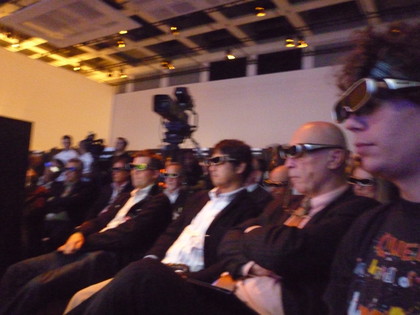LCD vs Plasma: which is the best for 3D TV?
We investigate which is the best 3D TV tech for you
Sign up for breaking news, reviews, opinion, top tech deals, and more.
You are now subscribed
Your newsletter sign-up was successful

LCD vs Plasma in 3D: the verdict
With so many factors affecting crosstalk on 3D TVs, it's impossible to find a definitive winner between LCD and plasma.
However, that doesn't mean both are as good as each other. Indeed, editor of AV trade title Home Cinema Digest and regular TechRadar contributor, Jamie Carter, thinks that plasma has the edge over LCD at the moment:
"3D is a very new technology – when did the first generation of any new tech look immaculate right from the off? It's true that the specification for 3D Blu-ray adopted throughout the industry came from Panasonic, so it has had more time to work on reducing crosstalk, but it's still first-gen technology.
"Crosstalk is basically when the two 3D images don't swap quick enough – your right eye is seeing what was only meant for the left eye, and vice versa. Surely this is mainly down to the speed of the panel - and in that regard, plasma is going to have the advantage for now. From what I've seen, I think plasma has the edge over LCD for now in terms of crosstalk – it's barely noticeable on plasma."
Brightness
Carter agrees with Tack that LCD TV's superior brightness can be an advantage, but when it comes to crosstalk he's not so sure it's a good thing.
Sign up for breaking news, reviews, opinion, top tech deals, and more.
"Plasmas are traditionally dimmer than LCD panels," he says, "but on either technology the 3D glasses cuts out a lot of the light. The lack of brightness is arguably safer since crosstalk is most obvious in 3D images that feature a lot of contrast between light and dark colours.
"It's fair to say that only 400Hz LCD TVs can expect to really challenge plasma in terms of reducing crosstalk, especially if 3D gaming becomes mainstream. Panasonic can't afford to sit on its laurels, though – there may be little crosstalk on a 3D plasma, but I've noticed flicker around the edges of moving objects; 3D is still some way from looking 'real'."
Meanwhile, although Panasonic has so far been the only company to release 3D plasma TVs, Carter thinks it could be telling that Samsung and LG have both recently launched 3D plasmas.
"Manufacturers are still testing the water. Until now Samsung and LG have been concentrating on LCD for their 3D sets, but both announced 3D plasmas at IFA – LG's PX990 and Samsung's C680 and C490 plasmas. Is that revealing, and a sign that LCD is being sidelined for 3D? It's more likely a case of sitting on the fence – Samsung, LG and Panasonic are the last three remaining manufacturers with huge plasma TV production plants."
It's not just Carter who believes plasma has the advantage, either. The consensus across the TechRadar team is that LCD has some catching up to do, and in fact we couldn't find any TV journalists at all who would endorse LCD as the superior technology.
So what does this mean if you're looking to buy a new 3D TV? The key thing to remember is that most of the content you're going to be watching will still be 2D. So basing your choice solely on 3D performance would be a mistake.
It's about finding that all-round performance sweet spot, which ultimately comes down to personal preference.
------------------------------------------------------------------------------------------------------
Liked this? Then check out Best LCD TV revealed: our pick of the top TVs
Sign up for TechRadar's free Weird Week in Tech newsletter
Get the oddest tech stories of the week, plus the most popular news and reviews delivered straight to your inbox. Sign up at http://www.techradar.com/register
Current page: LCD vs Plasma in 3D: the verdict
Prev Page LCD vs Plasma in 3D: the case for LCD
James was part of the TechRadar editorial team for eight years up until 2015 and now works in a senior position for TR's parent company Future. An experienced Content Director with a demonstrated history of working in the media production industry. Skilled in Search Engine Optimization (SEO), E-commerce Optimization, Journalism, Digital Marketing, and Social Media. James can do it all.